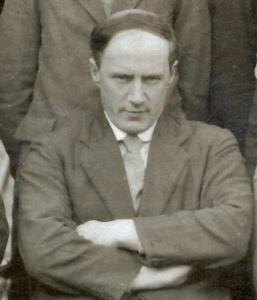 from a late 1920s School photo |
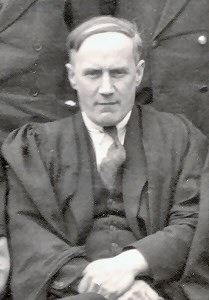 from the 1935 School photo |
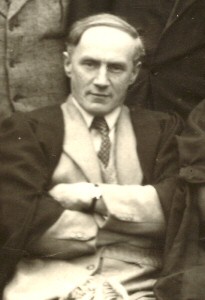 from the 1937 School photo |
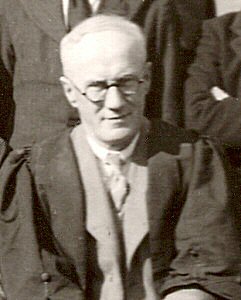 from the 1946 School photo |
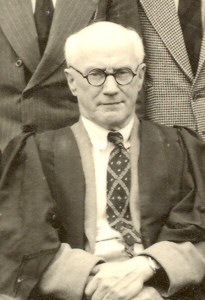 from the 1952 School photo |
from the Summer 1953 Soham Grammarian
We all heartily wish a long and happy retirement to Mr. G. L. Hunt, whose departure the School will deeply feel at the end of this term and for many a term afterwards. His twenty-six years of service in Soham were as loyal and devoted as they were unobtrusive. He came just before the present buildings were opened by Lord Eustace Percy in 1926; the school was then reorganized with a Rural bias. Many with much longer memories than those of the present generation will recall only too well how, largely owing to him and Mr. Ford, the school was definitely put on the map, at least in Agricultural Science; how the school became widely known for its winning of scholarships offered by the Ministry of Agriculture and other bodies, and how men of educational eminence, to mention only Sir John Russell of Rothamsted and professors at the University of Adelaide, came from all parts of the country and the commonwealth to study this experiment in adapting the youthful mind to its rural environment.
Let us not forget, either, that his labours and skill were expended wholly on 'B' forms, that is those deemed to be academically less gifted. Worthy citizens as hundreds of these boys do become, they present a far more complex problem and challenge to a teacher's powers than do the more quickly developing 'A' types. Almost any master, given the normal ability, and of course the adequate specialist knowledge, should be able to instruct picked pupils, or even a Sixth Form, but the successful teaching of the moderately or only slenderly endowed calls for infinite patience, infinite good humour, infinite resource. Such are the qualities that have enabled Mr. Hunt to survive with a smile this long-sustained endurance test, and to have more than earned his retirement to what, with his usual shrewdness of judgment, is about the loveliest village in the West Country - Wedmore. It is quietly renowned for Alfred's Peace with the Danes, and it will be remembered also by us, we hope, as a spot where another characterful Englishman drinks deeply and long of serenity, not omitting Somerset sun and cider, after the struggle.
When all the Rural Science schemes have been reorganized and all the textbooks have been rewritten, the germination of a seed, the ripening of a crop, the ritual of the seasons and the necessity of both man and boy to strive hard and long with Nature remain immemorially the same. This Mr. Hunt knew in his cradle; in this true and deep country sense alone was he old-fashioned; in this unique sense we may safely say that old-fashioned he was born: this is the ultimate wisdom that is new when the latest theory is old. His racy Wessex equivalent of the biblical "Gird up your loins" was "Get your boots on" ; his gospel was "Work and more work," not unrelieved with the humours of tests, whether he was concerned with the permanent inculcation of ideas or the successful development of a row of turnips.
As Keeper of the Door at the Stationery office he kept the same exacting but just eye on waste, whether master's or boy's, and as Lord High Treasurer of National Savings he had the same undeviating swoop on the spendthrift and his plausible self-excuses. With such inspired commonsense and motherwit as his, with such practical wisdom drawn from long ponderings on Earth and her manifold and mysterious offspring, he had little time for the merely clever-clever, the purely bookish, the momentarily new-fangled. Not for him heroics, beautiful paper-schemes or fine phrases, but the craftsman's unremitting application to the job in hand. He never flattered, for he had the rare sincerity that comes of harbouring no illusions about oneself or any pupil either. In short, his whole outlook is epitomised in the words of his great Wessex fellow-countryman, Thomas Hardy, to whom he is akin not only in race but in unrelenting candour, revealing irony and caustic humour : If way to the Better there be, it exacts a full look at the worst.
from the same issue
What dominated the mind of Macbeth for many years was Birnam Wood; what, with its many fluctuations troubled the mind of Mr Hunt, as with many other masters, was the Burnham Scale! It's good-bye to all that for him at the end of this term. His twenty-six years' devotion to Soham epitomises the work done by the gowned profession ... "You have done the state some service." Thank you, sir.
Soham Grammarian Summer 1960
"AND GEORGE"
Mr GL Hunt in retirement at Wedmore in Somerset continues to flourish like one of his favourite hardy perennials. Although his hearing and eye-sight have lost their keenness, George still retains his keen wit and dry humour.
He is actively guiding the finances of the local Young Farmers with as tight a hand as ever he held over school stationery. Mrs. Hunt too is in good health - as kindly and hospitable as ever. Both send greetings to all old Soham Grammarians.
CRW(aller)
Do you have other photos or any appreciations or anecdotes relating to Mr Hunt? please contact the editor
see also Alan Diver's wartime reminiscences
Terry Allen 39 (8 Mar 2005): When George Hunt or Farmer Jarge handed out an imposition it was quantified by the number of words e.g. 1000 word essay. This was a fiendish punishment as a 6 page essay could be as small as you dare cut the pages. He had the habit of clearing his throat noisily, attributed to a gas legacy from WW1 [also recalled by Colin Thornhill 40 (11 Mar 2005)]. I think he was fairly popular and who could forget his FYM (farm yard manure) in his rural science lectures (I liked him).
page updated 16 Mar 2010